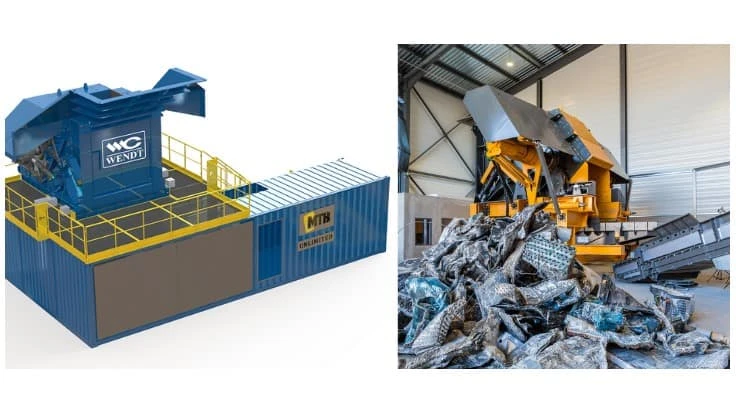
Image provided by Wendt Corp.
Buffalo, New York-based Wendt Corp. has announced the sale of a Wendt/MTB EZR Pre-Shredder to Indiana-based Rochester Iron and Metal. Although there are several EZR installations worldwide, the sale of the unit to Rochester represents the first United States install, says Wendt Corp. The unit is scheduled to be installed and operational in the fourth quarter of 2021.
Wendt Corp. describes Rochester Iron & Metal as a fourth-generation, family-owned business with predecessor companies that have been serving the scrap industry since the early 1900s. Jason Grube and stepfather, Mooch Lewis, partnered to form Rochester Iron and Metal in 2002.
After installing one of the first Wendt M6090 shredding plants in 2012, the company has experienced exponential growth, expanding from 17 employees to more than 100. Rochester’s growth became apparent in 2013, a year after the shredder was installed. “Initially our estimates for the shredder were 4,000 tons a month,” says Jason Grube, president of the firm. “By the end of 2012, we were at capacity with 10,000 to 11,000 tons per month.”
The company also operates a feeder yard in Kokomo, Indiana, and a newly purchased yard in Logansport, Indiana. Along with the shredder, the company contributes its growth to dedicated customer service, the cleanliness of its facilities and strong relationships it has built and maintained, according to Wendt.
Grube says, “One thing we didn’t account for with the purchase of the shredder was the visibility that we gained. The amount of prime scrap that we acquire that doesn’t go through the shredder has been impressive.”
Growth and operating heavy equipment also brings with it challenges. In late 2018, Rochester Iron and Metal experienced a massive unshreddable introduced into its mill. After an initial scare of being told the shredder would be inoperable for up to six months, the company made significant changes surrounding the business.
“We were very fortunate that we were back up and running within 4 days,” Grube says. “However, we never want to be in that situation again. We have spent a lot of money over the last few years buying spare parts in case that single event was ever to occur again. By purchasing the preshredder, we’ve invested in insurance that those events are going to be less likely now than ever before.”
With the ever-decreasing availability of business interruption insurance for auto shredders, the EZR Pre-Shredder offers Rochester an alternative form of insurance with a much wider range of benefits, says Wendt.
A preshredder uses low-speed, high torque technology to homogenize hammermill feedstock. This allows a shredder to achieve “full box shredding,” increasing tons per hour while decreasing the wear on castings, says the equipment and technology firm.
In addition, preshredders give operators the ability to catch and remove unshreddables prior to the shredder, ideally reducing the chances of catastrophic failure at the mill. By operating at a slow speed, preshredders can puncture explosive containers without creating an ignition source that is typical in a hammermill. This, in turn, helps to reduce the number of conflagrations or loud booms in the hammermill.
“Wendt’s long-standing exclusive partnership with MTB has brought new and innovative equipment and recovery concepts to fulfill our customer’s needs. The development of the EZR Pre-Shredder is no exception,” says Ethan Willard, Wendt shredder business development manager, of the France-based company that designed the EZR model.
“The preshredder allows our customers a simple and unintrusive way to expand their business by maximizing the utilization of existing assets,” adds Willard. “I believe preshredders will revolutionize existing shredder operations with [their] ability to increase production and decrease operating costs and downtime.”
Rochester’s EZR Pre-Shredder is capable of handling up to 70 tons per hour and features the same modular features that Wendt has introduced in its other equipment lines. “It just made business sense,” says Dan Zeiger, controller for Rochester Iron and Metal.
“With the increased throughput from the preshredder, we are basically going to become an 80-inch mill without the installation costs,” Zeiger continues. “I’d rather invest than sit back and just be scared all the time that what happened in 2018 will happen again. From a financial perspective, the payback estimations are in months, not years. It’s hard to say ‘no’ to an addition to our processing stream that will ultimately be very profitable.”
Wendt describes the EZR as the first preshredder on the market that allows for the adjustment of the output density and throughput of the machine after installation to tailor an operation to meet customers' specific demands. Available in sizes from 5 to 150 tons per hour, the EZR product line covers a wide range of applications, according to the company.
The purchase of the Wendt/MTB EZR Pre-Shredder represents the third capital equipment transaction Rochester Iron and Metal has conducted with Wendt. “From the beginning, Wendt has helped walk us through how we can enhance our current processing stream,” says Zeiger. “The strong relationship between our companies begins with the people. Jason [Grube] and Tom [Wendt] have a lot in common-their ages, their drive and they both have this like-minded engineer[ing] thought process.”
Latest from Recycling Today
- BMW Group, Encory launch 'direct recycling’ of batteries
- Loom Carbon, RTI International partner to scale textile recycling technology
- Goodwill Industries of West Michigan, American Glass Mosaics partner to divert glass from landfill
- CARI forms federal advocacy partnership
- Monthly packaging papers shipments down in November
- STEEL Act aims to enhance trade enforcement to prevent dumping of steel in the US
- San Francisco schools introduce compostable lunch trays
- Aduro graduates from Shell GameChanger program





